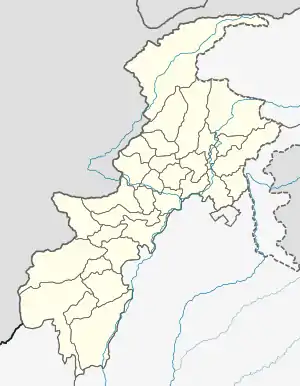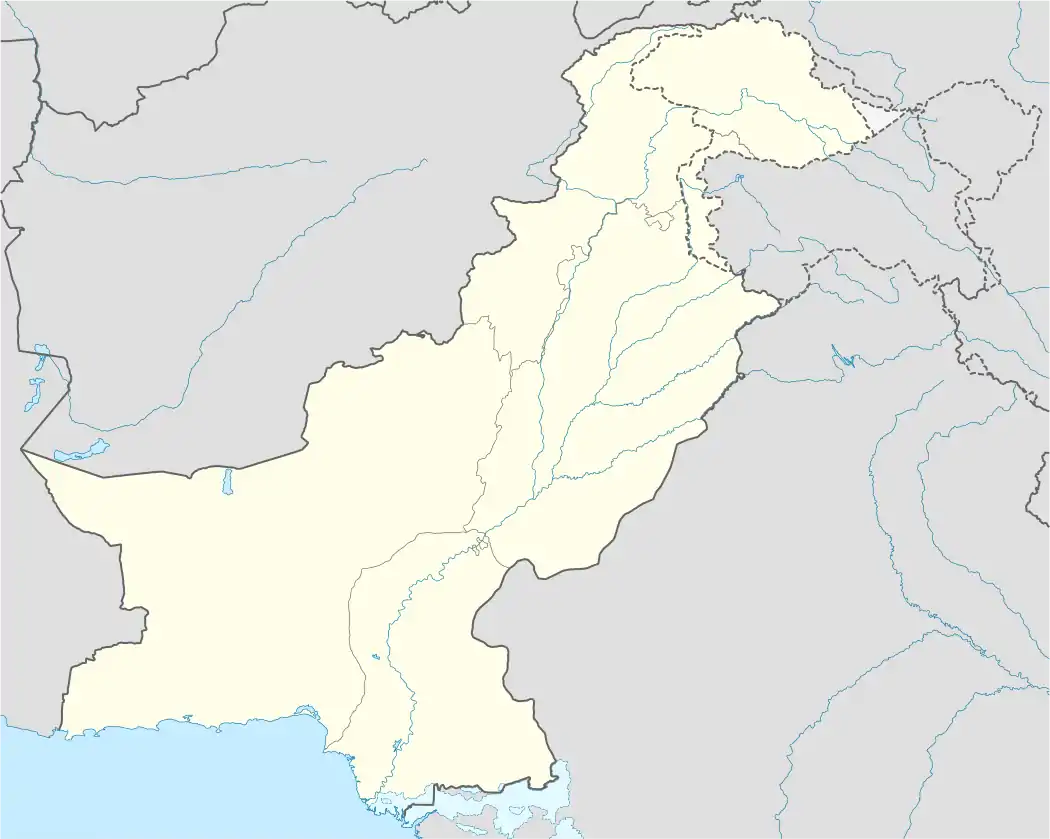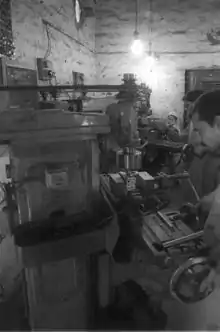Darra Adam Khel
Darra Adam Khel (Pashto: درہ آدم خیل) is a town in Kohat Subdivision, Khyber Pakhtunkhwa, Pakistan. Formerly a part of the Federally Administered Tribal Areas (FATA), it has gained fame and notoriety for its bazaars packed with gunsmiths and weapons merchants. The town consists of one main street lined with multiple shops, while side-alleys and streets contain workshops.
Darra Adam Khel
درہ آدم خیل | |
|---|---|
 Darra Adam Khel  Darra Adam Khel | |
| Coordinates: 33.684°N 71.516°E | |
| Country | |
| Region | |
| District | Frontier Region Kohat |
| Time zone | UTC+5 (Pakistan Standard Time) |

The town is mostly inhabited by ethnic Pashtuns belonging to the Afridi tribe. Darra Adam Khel was the hometown of Ajab Khan Afridi, an Indian-Pakistani freedom fighter who sought to free the Indian subcontinent from the rule of the British during the era of the British Raj.
Economy
A wide variety of firearms are produced in the town, ranging from anti-aircraft guns to pen guns. Weapons are handmade by individual craftsmen using traditional manufacturing techniques, which are usually handed down from father-to-son. Guns are regularly tested by test-firing into the air.[1] Darra is controlled by the local tribesmen.[2] Darra Adam Khel is an unkempt village of two storey wood and adobe buildings in the sandstone hills near the Kohat Frontier region. It is the gun factory of the Tribal Areas, located around 40 kilometres (25 mi) south of Peshawar on the road to Kohat. The drive takes around forty minutes. Darra (Adam Khel denotes a clan of the Afridi Tribe) is inside Pakistan but has certain special laws as compared to rest of Pakistan. Most of the people here make or sell just one thing, i.e., guns, while the second largest business of the inhabitants is transport.
In the arcades off the main road are workshops. Hundreds of closet-sized rooms where men and boys make working copies of the entire world's guns with nothing more than hand tools and a small drill press. The tools are astonishingly primitive, yet the forges turn out accurate reproduction of every conceivable sort of weapon, from pen pistols and hand-grenades to automatic rifles and anti-aircraft guns. The copies are so painstakingly reproduced that even the serial number of the original is carried over. A Darra gunsmith, if given a rifle he has never seen before, can duplicate it in around ten days. Once the first copy is made, each additional copy takes two or three days due to the templates created. Handguns, being more complex, take a little longer.
In Darra, almost three-fourths of the people are in the gun trade. Pen pistols and walking stick guns are popular here. Around 400-700 guns are made in Darra each day and the number is rising with the adoption of more tools. These guns are more than enough for the Pashtuns themselves. Many guns find their way to and from Afghanistan. In the 1980s, heroin was shut down in the markets after consultation with the tribal elders due to foreign pressure, but guns, known as the ornaments of a Pashtun, could not be eliminated. Manufacturing of heavy ammunition, however, has been closed down.
Travel by foreigners to Darra is forbidden due to security reasons. Travelers can drive by bus or car through Darra without a permit but it is not advisable because tribal police (Khasadar) visit the market to check for any local rules and law violation. Foreigners without permits are taken to secure places to avoid any mishaps.
The Darra arms trade first fired up in 1897. This arms trade has won a fame for the Adam Khel Afridis who are the major inhabitants of the town.
According to Vice News, the gun trade in the area was affected by Taliban and was forced to go underground.[3]
Tourism
Michael Palin visited the town as part of his Himalaya television series, as did Ethan Casey in his travel book Alive and Well in Pakistan while Australian film director Benjamin Gilmour's feature drama Son of a Lion set in Darra Adam Khel premiered at the Berlin International Film Festival 2008. Suroosh Alvi of Vice Media also entered the market-town in 2006 for a segment of Vice Guide to Travel.[4]
There is huge potential for tourism in the areas because its home to some of the best scenic views in the regions. Its moderate weather and tracking terrains in Toor Chapper, Lal Shah Baba, Toor Kamal Baba, Sani Khel, Bosti Khel, Aam Kammi tops, and Zoor Akhwar coal mines provide opportunities for outsiders to explore the area and its ways of culture and tradition.
Notable people
See also
References
- Firearms Stalls Line The Streets Of Pakistan Town
- Mohsin Jamil Baig (2003). "Governor urges tribesmen to purge outlaws from FATA". OnlineNews.com.pk. Archived from the original on 2011-09-28. Retrieved 2007-08-17.
- "VBS TV: "Gun Markets of Pakistan": Where the Taliban Goes Shopping (+ Slideshow)". www.vice.com. Retrieved 2021-01-14.
- https://www.youtube.com/watch?v=FinRqCocwGE
External links
- 'Tribesmen Rally to the Gun', Observer article September 23, 2001
- Information about Darra Adam Khel, with images 2005
- Photo gallery
- Pakistan's flourishing arms bazar BBC News 21 June 2006
- Travel account, with images August–September 1992
- Like the Wild, Wild West. Plus Al-Qaeda. The Washington Post March 30, 2008
- Son of a Lion official website 2008
- 2007 video of Darra, from VBS.TV
- Proliferation of Small Arms and Light Weapons in Pakistan